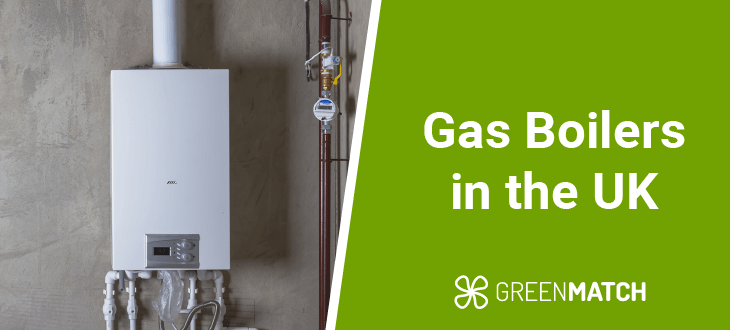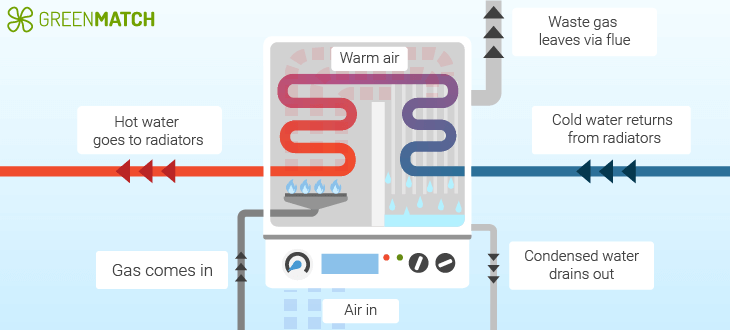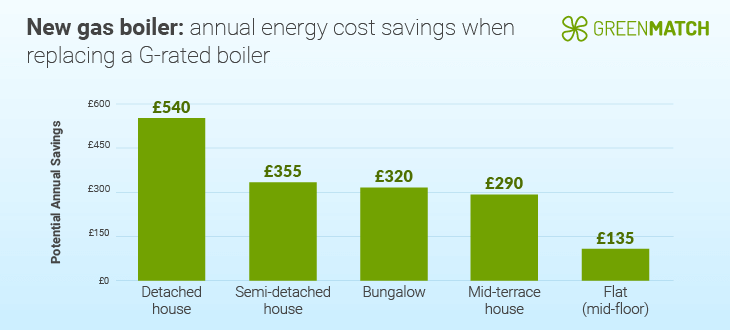Answer these simple questions and we will find you the BEST prices
Which type of solar quotes do you need?
It only takes 30 seconds
100% free with no obligation

Get up to 3 quotes by filling in only 1 quick form

Slash your energy bills by installing an energy efficient boiler

We’ve helped over 500,000 homeowners reduce their carbon footprint
- GreenMatch
- gas boiler
Gas Boilers in the UK: Your Definitive Overview in 2025

The ban on the sale of new gas boilers in 2035 has been scrapped, according to reports released on 7th January. It’s thought the new Future Homes Standards (due to be announced by the Government later this year) will no longer include a ban on gas boilers in new builds. This means gas boilers will still be a viable option for homes across the country.

Gas boilers are a staple to domestic heating in the UK. As we transition to low-carbon energy systems, such as heat pumps, they'll continue to play a significant role. Despite the increasing deployment of heat pumps, the UK is expecting at least 10 million further domestic gas boiler installations until 2035, according to a 2023 report published by the Department for Business, Energy & Industrial Strategy.
Chances are, you have a gas boiler in your kitchen cupboard or closet. They're great for saving money for homes on the gas-grid, and they can be a good choice while you consider eco-friendly options.
But what is a gas boiler and why are we slowly transitioning away from it? Are there different gas boiler types and will any of them be banned? We'll answer all of your questions about gas boilers in this article.
If you're uncertain about the type of boiler in your home or whether a gas boiler is suitable for your needs, don't hesitate to reach out to a Gas Safe registered boiler installer. Their expertise ensures they can assess your situation accurately. By evaluating your home, they can recommend the best steps to optimise both cost-effectiveness and reduce your carbon footprint. Get in contact with up to 3 installers from GreenMatch's network of Gas Safe registered installers.
GreenMatch makes it hassle-free to find the perfect boiler at the best price! By partnering with trusted Gas Safe registered installers, we offer you up to 3 tailored quotes from our network of experts. Why up to 3 quotes? 3 gives you the opportunity to compare and choose the best quote for you. The best part about this service is that it's all free and comes with no obligations to accept any of the quotes you receive.
Get started by clicking the button below.
- Quotes from local engineers
- Payment by finance available
- Save up to £975
It only takes 30 seconds



What is a gas boiler?
A gas boiler is a popular type of central heating system in the UK that runs on natural gas. It heats water to provide domestic hot water to your taps and to provide gas heating to keep your home warm during the colder months. You'll typically find them installed in a kitchen cupboard, a closet or in a hallway in UK homes.
Every year, up to 1.7 million domestic natural gas boilers are installed in the UK. While natural gas is a cheaper fuel than alternative fuel types, such as oil, LPG, biomass, and electricity, it is also one of the most polluting.
The millions of gas boilers in UK homes emit 2x more carbon emissions than all of the UK's gas-fired power stations. It will come as a bit of relief to know that by upgrading an old boiler, you can already save up to 1,200kg of carbon annually (that's equivalent to driving over 3000 miles (4800 kilometres).
How does a gas boiler work?

When you look at your boiler, you'll find many pipes coming out of it. Your boiler uses these pipe connections to provide hot water and gas heating. Some of the most important connections that a boiler installer will have set up for you are: connection to the gas grid, connection to the mains water supply or water cylinder, and connection to your home's radiators and taps.
We've broken down the essentials of how a gas boiler works below for you:
Step 1: Thermostat setting
The thermostat senses that the temperature of the home has fallen below the desired setting. The thermostat sends a signal to the boiler to turn on.
Step 2: Fuel combustion and heat transfer
When your gas heating system turns on a valve opens. This allows natural gas from the mains to go into a sealed combustion chamber within the boiler. This gas, entering through small valves, is ignited by an electric switch, creating distinct blue flames. These flames heat the heat exchanger which efficiently transfers the generated heat to the cold water pipe, raising the water temperature to approximately 60°C (140°F).
Step 3: Water circulation and radiator heating
Once the water reaches the desired temperature, a nearby electric pump propels it through an intricate network of pipes spread throughout your home. This network distributes hot water to all your radiators, taps, and showers across your home.
The hot water flows into each radiator, following a closed loop where it enters at one end and exits at the other. This systematic process occurs in every radiator, effectively heating each room in your home.
Step 4: Water return and reheating
After circulating through all the radiators, the now-cooled water returns to the boiler. Since it has significantly cooled, the boiler reignites the gas jets to reheat the water before it re-enters the system. This continual cycle maintains a consistent and comfortable heating environment throughout your residence.
Step 5: Waste gas disposal
While the boiler operates, burning gas to heat the water, it produces waste gases that require safe venting outside the home. This essential task is accomplished through a designated tube called a flue, ensuring the secure expulsion of these gases.
Types of gas boilers in the UK
There are 3 types of boilers types that can run on gas:
- Combi gas boiler
- System gas boiler
- Conventional gas boiler
Not all boiler types are suitable for every home. This is because each boiler type operates a bit differently and require different installation parts. For each boiler type, some of the most important factors to consider are the number of residents in your home, your heating and hot water demand, and your current system.
In this section, we've briefly summarised the most important things to know about each type of gas boiler alongside a diagram of how they work.
Combi gas boiler
The combi gas boiler is one of the most popular boiler types due to its versatility, easy access, and relatively simple installation. Its name refers to the fact that a combi boiler can "combine" as both a water heater and a central heating unit.
It is especially popular among smaller households with fewer members. That is because the way this self-contained unit heats water and regulates flow rate means it is difficult to supply large amounts of hot water to taps running simultaneously. When a combi gas boiler is installed by a Gas Safe registered installer, it can be pretty straightforward because there are no extra units to store water. Instead, all of the needed parts are conveniently located inside the unit.
System gas boiler
Unlike the combi boiler which is a completely self-contained unit, this type of boiler requires a hot water cylinder. What this means for you is that a system boiler is more suitable for homes with larger heating and hot water demands. It's able to supply this by receiving cold water directly from the mains, heating it, and transfering it to an unvented hot water storage cylinder for storage until it is needed.
Conventional gas boiler
Of all the boiler types, the conventional gas boiler (also known as a regular gas boiler) consists of the most parts. This includes the boiler unit, heating controls, a hot water cylinder, a cold water storage cistern, and a feed and expansion tank. Similar to the system boiler, it can supply large amounts of hot water to homes with many residents.
Because of the numerous components, additional installation efforts, and extra space needed, conventional gas boilers in the UK are generally not chosen for installation in new constructions. Instead, combi or system boilers are preferred.
Seeking a Gas Safe registered boiler installer for your home? GreenMatch provides a hassle-free solution. With our network of experienced installers, we ensure the expertise and safety your home deserves. Understanding the nuances of different boiler types and fuel options is crucial, a matter best discussed with a seasoned professional.
Don't risk a poor installation that can cause complications down the line. Through GreenMatch, you have the opportunity to receive up to 3 quotes from our trusted network. Compare these quotes, make an informed decision, and enhance your home's heating system.
The installer and quote comparison all starts by clicking the button below.
- Quotes from local engineers
- Payment by finance available
- Save up to £975
It only takes 30 seconds



Will gas boilers be banned in 2025?
According to the latest reports (Jan. 7th), all plans to ban gas boilers will now be scrapped by the new labour government. The previous government imposed a gas boiler ban, which meant no installation in newly built homes from 2025, and a full ban on the sale of gas boilers from 2035. However, government sources have confirmed these plans will no longer go ahead.
However, it's worth mentioning that this could still be subject to change. Until the government releases its new ‘Future Home Standards’ policy, it’s unclear whether new rules and regulations will come into effect. As of January 2025, though, it seems gas boilers will be safe for at least another 10 years.
In September 2023, the previous UK Government announced a press release about their commitment to the 2050 net zero goal. In addition to increasing grant amounts for the Boiler Upgrade Scheme, something which the new government is set to continue, and extend.
In summary, here's what you need to know about gas boilers if you have or plan on installing a new gas boiler in the UK:
How much is a gas boiler?
On average, you can expect a new gas boiler cost to set you back between £1,500 and £4,000. This includes the cost of the gas boiler unit and the installation.
| Type of boiler | Cost excluding installation | Cost including installation |
|---|---|---|
| Combi | £500 – £3,000 | £1,500 – £4,500 |
| System | £580 – £3,500 | £1,700 – £4,000 |
| Conventional | £600 – £3,500 | £1,700 – £4,000 |
The large variation in our estimated cost mainly hinges on the boiler model and the installation complexity. Going with a boiler model from a top brand with a large output capacity will naturally increase your costs.
When it comes to the installation cost, the main one to consider is that switching from one gas boiler type to another will be more expensive than doing a like-for-like installation. This lays the groundwork for how complex your installation will be.
Here are some more installation costs to consider:
How much can you save with a new domestic gas boiler?
Gas boilers aren't very energy efficient compared to low-carbon modern alternatives. And like other systems, their efficiency degrades overtime. That's why it's recommended to replace your boiler after 10 to 15 years. By switching from an old, G-rated boiler to a new, A-rated boiler, you could save as much as £540 every year.
How much you save depends on the type of house you live in and how old your boiler is. Every year that you have your boiler, it loses more and more energy efficiency. G-rated boilers have less than 70% energy efficiency. That means 30% of the energy it uses essentially goes to waste.

Finding the best gas boiler installer
It is important to find a gas boiler installer that you trust because complications with a gas boiler down the line can end up being costly and hazardous. When selecting an installer, we recommend focusing on three key qualifications:
That's the same trusted criteria we used to build our network of partner installers from across the UK. That means, regardless of your location, we can help you find the best gas boiler installer. In fact, we can connect you with up to 3 installers, all committed to providing their best market-valued quotes so that you can save the most money.
Ready to start finding the best Gas Registered boilers in your area? Complete a 1-minute form to start comparing up to 3 boiler quotes from local and qualified installers. This entire service is free and comes without any obligations to accept any of the quotes you receive.
Get started by clicking the button below.
- Quotes from local engineers
- Payment by finance available
- Save up to £975
It only takes 30 seconds



FAQ
The average lifespan of a gas boiler is 10 to 15 years. While your boiler may still operate after 15 years, it will operate at a lower efficiency because boiler efficiency degrades over time. That means keeping your boiler after its lifespan may cause less reliable heating and increases on your energy bill.
If you notice signs of your gas boiler getting old, then we recommend you replace it. If you are able to, we recommend upgrading to a low-carbon and renewable system, such as solar panels or heat pumps, due to their higher energy efficiency and lower environmental impact.
The average cost of a gas boiler is anywhere between £1,500 and £4,000 (including installation). This is an estimate based on actual installations. A boiler installer can help you consider the many factors that affect your final cost and provide you a more exact estimate.
As of January 2025, gas boilers are no longer being phased out or banned. They will still be available to purchase and install for the foreseeable future. However, efforts are still ongoing to encourage homeowners to switch to low-carbon systems, such as heat pumps. The grant for heat pumps has recently been increased to help with the transition.
If you’re looking for the easiest gas boiler replacement, then we’d recommend replacing it with the same type of system. If you’d like to invest in your home’s future, then we’d recommend replacing a gas boiler with either solar panels, heat pumps, or a hybrid system.

As a writer with a deep understanding of low-carbon energy systems, Hannah aims to breakdown knowledge barriers and share insights to empower individuals in their pursuit of creating more environmentally conscious homes.

We strive to connect our customers with the right product and supplier. Would you like to be part of GreenMatch?

